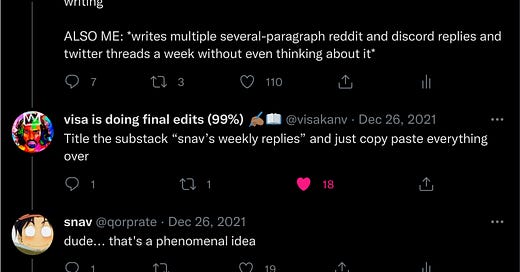About This Newsletter
What happened?
And then, in Discord:
And that’s what I’m gonna do. In terms of structure, I want to summarize and clean up some of the major ideas I’ve conversed about over the past week, providing links to the original discussion if possible, as well as some extra, smaller stuff at the end. Like an “in case you missed it” section. So, feel free to skip around. Also: I still plan to use my other blog for longer-form pieces, which I might link here, but also maybe not, because what I like about that blog is that nobody reads it.
Also also: before I proceed, You should check out the writing of the two fine folks above who inspired me, Visakan and “John Zybourne” (he beat me to the punch!).
Time Out Of Mind
I returned on Sunday from a New Years weekend at a massive, rural Airbnb upstate (complete with sauna and hot tub), where I put my phone on airplane mode and left it there from Friday through Sunday.

While I was sitting without internet, I wrote the following in my notebook:
It felt like I was in an alternate space, where the only use of my phone was directions and photos. No laptops either, of course. All the social energy was here.
A bit cryptic. Not sure what I meant by that. Note the past tense, as if I was already done with the weekend while experiencing it. I wrote another paragraph:
Thinking about Taylor’s idea of time. Higher time recurs, is not a void space but is knit together thru repetition. All senses have potential to return one to that space, and social rituals too, but music hits me the most. Music contains its own temporality in a way the other senses don’t. A song both circumscribes a chunk of secular time, and links you to the other times you heard it in a more immediate way than a symbol. It thus maintains that space, and can be enacted on demand. Hence the power of the mix.
For context, I’ve been participating in a reading group of Charles Taylor’s A Secular Age, and one of his main ideas is that time itself works differently in modernity. Older conceptions of time treated it as cyclical, as it remains in astrological theory, with certain moments quilted together by virtue of their similarity. For example, each Christmas Day could be considered “closer” to Jesus’s birth than a random day in the prior year, despite the latter date being “closer” in terms of calendar years. Taylor argues that the development of secular, “empty” time as the primary (perhaps only) form of time is one of modernity’s defining features.
In our discussion group, I theorized that the intense pre-modern focus on clock-making as the most immediate application for new technological developments (a point made in a post I unfortunately can’t find right now) pointed to secular time as a sort of “dream” technology, an unrealized desire that remained ever on the horizon. But desired by who, exactly? What sorts of people in what positions wanted accurate secular timekeeping? I think the Marxists took this one up.
I would share some more quotes and topics of discussion from the reading group, but I can’t get our notes to load, so maybe next newsletter.
Some Sense about Stage Systems
Psychologist Robert Kegan has reared his head once again in “the discourse”. In a series of conversations with multiple individuals stretching back several weeks, I made the claim that “almost nobody is at stage 5. I take Kegan seriously when he says that it’s never achieved before age 40,” citing the restrictions on Kabbalah study to that same age as evidence.
The basis of my claim was that I assumed Kegan’s “stage 4: institutional self” implied adherence to a single structuring principle, akin to Kohlberg’s “stage 6”, the “principled” stance, and that moving to Kegan’s “stage 5” meant transcending one’s structuration altogether. To give an example, I had assumed that someone who maintains a strict materialist ontology, i.e. “only real things are real, there is no supernatural” could not be “stage 5”, because that sole principle was the basis of their method of knowledge production.
…and then I poked through Kegan’s books (The Evolving Self and In Over Our Heads), and realized that I was totally, dead wrong.

My mistake was confusing “structuring principle” for “system”. Kegan’s “institutional self” is explicitly defined as a system, which the subject rigidly identifies with, whereas stage 5 means identifying with the process, which means identifying with or “being” the Movement itself:

Given these original meanings, I can safely say that I do know some stage 5 individuals, and that the rigid rationalism of LessWrong, etc. is often a signal of stage 4, and that Meaningness was actually correct in his use of Kegan’s work, so I should stop shitting on him for being wrong (sorry about that Toby).
The final important aside is that Kegan’s work is a single series of stages, but the stages can be viewed as either “affective” (relating to values) or “cognitive” (relating to knowledge). I’m still a little unclear on which is which, whether the formal shift occurs in both around the same time, or whether one can get stuck in an earlier affective stage while advancing cognitively. One of the papers I read while investigating the “Model of Hierarchical Complexity” and whether Kegan Stage 6 exists (something like “postformal” thought, whatever that means) had this neat diagram, though:
Why I Like Lacan
While reading Kegan, I came across an interesting quote about his idea of the ego:

I shared it in a group chat, and the discussion moved into more psychoanalytic territory. We discussed the Freudian conception of the ego (short version: it’s complicated, long version TBD), and then my “favorite” theorist, Jacques Lacan, was brought up (his version of the ego is even more different).
I wrote in the chat: “the thing that draws me to Lacan is his special position with respect to the linguistic turn, in a way that I think no other theorist can really handle.” When asked to justify, I explained:
Lacan's entire thrust was to de-associate "psychology" from "speech" or at least create a way to treat the two phenomena as separate, which is actually the only way to break the stranglehold of structuration. This is because "psychology" aside from Freud alone sets out from the Cartesian notion of the subject as a unity (even in Hegel/Heidegger).
Lacan holds to the primacy of speech over the mental, which allows him to engage with "pre-Cartesian" theory, in the sense that "I" am constituted after my speech rather than prior to it. So this lens lets you cut through the tangle of identity, self-concept, etc, because it focuses on the act (of course, those tangles appear later, but as objects rather than premises).
I think the main flaw with vast majority of philosophy both now and historically is that the unified self is taken as a premise (and Charles Taylor interrogates and historicizes this fact explicitly in his books), whereas the internet disconnects the unity of self from speech with the "dis-embodiment" of (online) identity.
So Lacan is basically the only theorist prepared for social media, IMO (at least in a form which correctly notes speech as primary to self-conception and not the other way around). That said, I've found e.g. Eric Berne to be far more useful in terms of de-tangling my own emotional shit.
Staunch German Idealists will note that I’m abusing Hegel and Heidegger here by equating “Being” with the Cartesian subject, but, cmon, that’s not really what their work is about (it’s about cybernetics).
Also, don’t ask for me for a Lacan primer. I don’t have one, and I don’t recommend reading him anyway. You should probably read Anti-Oedipus instead, which I haven’t read, but which realitygamer tells me “was intended as pop philosophy for a target audience of 15-20 year olds,” which I completely believe based on all the art student freshmen who will tell you unprompted how “Deleuze saved my life.”
Miscellania
A one-off twitter thread about being in a book club and buying an Xbox controller to play Binding of Isaac (if you own an Xbox One or the newer model and live within driving distance of NYC, please hit me up… I need some controller help):




Minerals (and Vitamins) posting:


The best Omicron content I’ve seen yet:


Song of the week (by fiat — we were forced to listen to this on loop over the weekend. No, I will not share the Karaoke videos):
Song of the week (for real, yes I’m still on a Hiroshi Sato kick):
Thanks for reading, hopefully next post will be shorter, more to the point, and all that good stuff.







Came to you through the Astral Codex Ten Lacan Review pipeline, lol. Interested to see what you have to say. I'm new to rationalist spaces (new, and not entirely sold) and something that's been niggling me since coming upon them was the absence of influence from continental philosophy/critical theory/psychoanalysis/post-structuralism etc. The thing which set me off, I remember, was somebody trying to come up with a new term, for use in the analysis of cultural progress, that would mean not just to move past, but to "transcend and include". I can't remember the term and I can't remember the poster, but I remember thinking: "You must be trolling, this is just sublation!" There have been other instances since. So, I was very excited to see someone holding down the lacanian side in the comment section--and yet more excited when I found out that person had a blog. I'm wanting for intellectual community, and while the rat space is vibrant, I think I am too heterodox to fully take the Yud-pill--so I'm hopeful for this space in the future. I've been reading a Secular Age all by my lonesome the past few weeks D,,,,,: So it's nice to imagine somewhere people are reading those sorts of books together.
I usually don't like to ask questions in comment sections of creators/writers--when other people do it it always strikes me as presumptuous--but given this comment section isn't exactly packed, I don't feel my usual reservations. You mention in one of your comments over on ACX blogs you read which brought you to Lacan--would you mind name-dropping those? I'm trying to develop a good diet for myself of this sort of stuff; your blog here is going to be my start, but I'm interested in expanding out from there. Also, more generally, do you have any general advice for someone isolated from more traditional forms of intellectual community--I'm not associated with any university, is what I mean--who is therefore seeking such online? How did you fall into it?